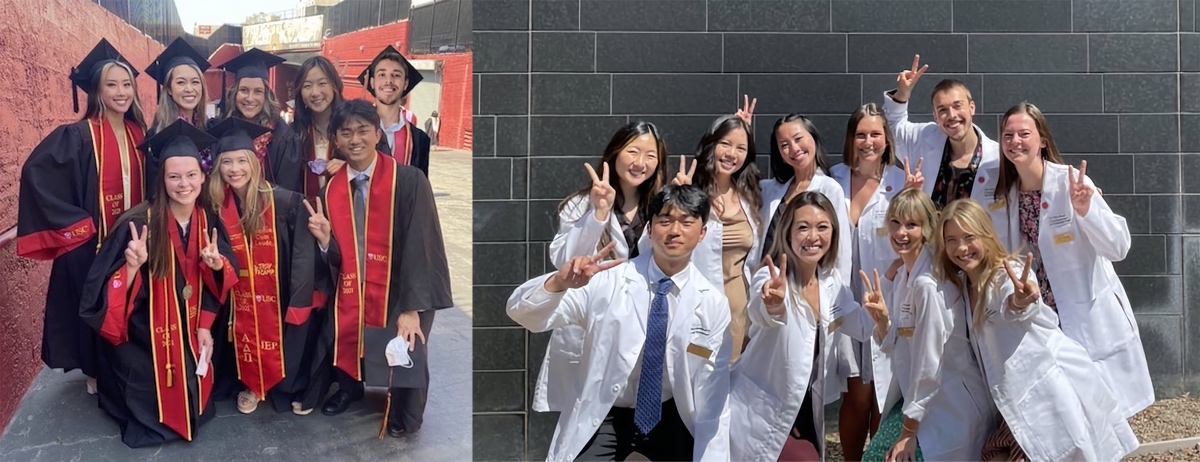Student Blog
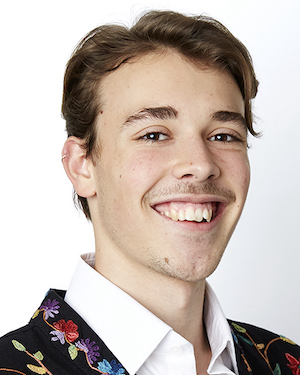
9 Perfect Strangers: A Cohort’s Connection ⟩
December 21, 2021, by Seth
Here at USC, we often talk a lot about the Trojan Family, but when you arrive on campus as a first-year that sentiment can feel intangible. But the truth is, for me, I found my family before my first semester had started, even if I didn’t know it at the time. Traditionally, fall move-in day takes place on the Wednesday before the first day of classes and is followed by six weeks of welcome week programming. During this time many students rekindle friendships with people they met at orientation, attend Visions and Voices events, or just settle into the place they will be calling home for the next couple of years. In the case of the Class of ‘21 and ‘22 BS-MA OT students, we attended the USC Chan Division’s First-Year Welcome Dinner.
I may not remember all of the details from that dinner, but some things have stuck with me over the years. 1) I chose a completely hairless action shot of me swimming to showcase my favourite occupation as my grand debut 2) Back and forth O-H!, I-O!-ing with Dr. Samia Rafeedie and Dr. Shawn Roll whenever any of us brought up our experiences in Ohio and 3) the first spark of connection I felt when meeting my cohort for the first time.
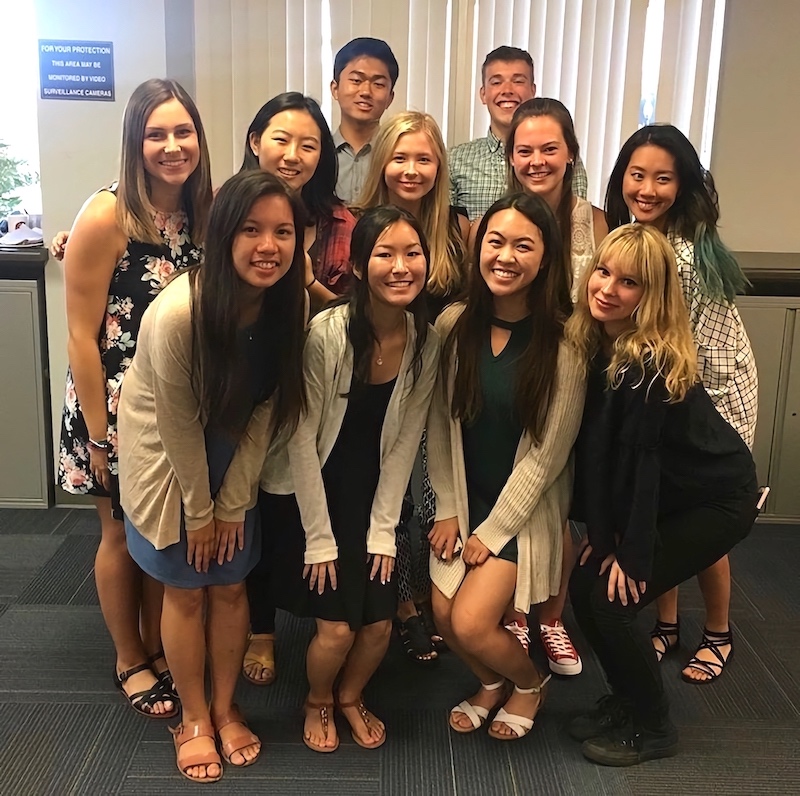
The Class of ’21 and ’22 taking their first picture together at the USC Chan Division’s First-Year Welcome Dinner
Over time that connection has grown thanks to the design of the BS-OT program. Despite the program having a built-in buddy system, it didn’t feel forced. As an undergraduate OT student, you’re granted a lot of freedom to explore what college has to offer, while also knowing you have Chan to come back to. The course sequence is laid out in a way that slowly scaffolds your knowledge of OT. This is done not only through the complexity of the content but also through the number of classes you’re taking. This all culminates when you’re fully immersed in the graduate program. But this also means that you can scaffold the cohort experience too (More details about the progressive program in a blog coming soon so say tuned)! Some OT courses allow you to select the date and time so you may see some folks one semester and the others the next (like OT250 and OT251), while there are other courses that most of the cohort will take at the same time (often anatomy and physiology). As time goes on, you’ll also start coordinating all of these together and commuting between campuses and before you know it, you’re no longer classmates, but full-on friends! From these bus rides to hiking, and rollerskating, and museum trips together with Dr. Amber Bennett, you’ll develop a support system as you head into the graduate program together. For me, this is when these friends became family.
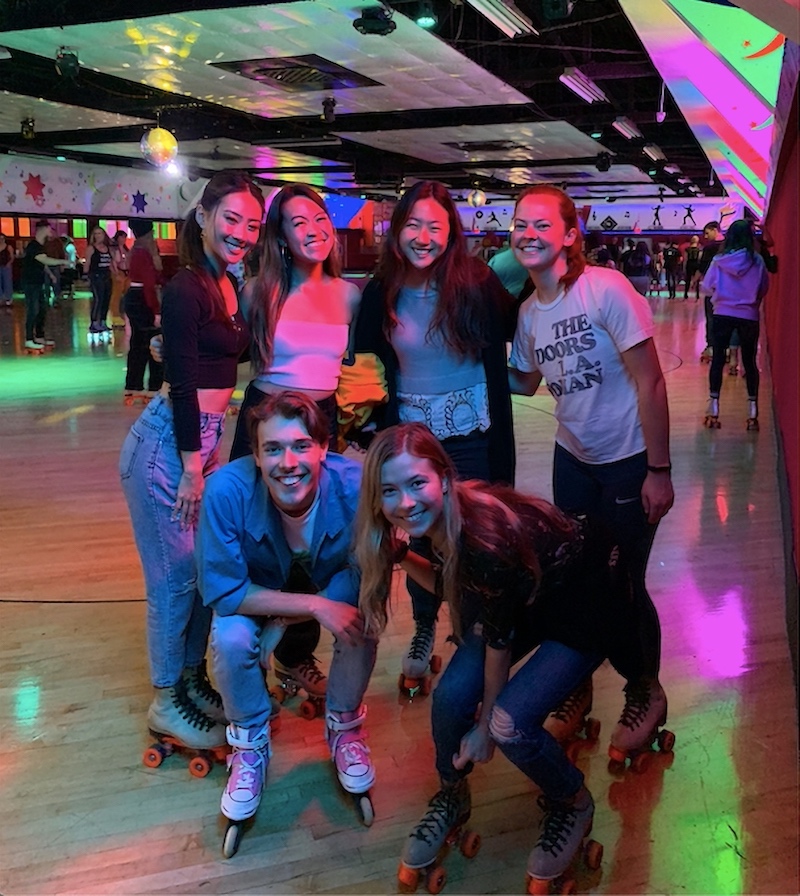
One of Dr. Bennett’s famous BS-OT outings, skaters gonna skate! 😎
Suddenly you go from the OT foundation courses that were just your cohort to the full grandeur of the 145 other OT graduate students, you’re navigating graduate-level courses full-time, commuting to the health science campus, and trying to grapple with the occupational transition. It can feel like a lot to tackle all at once, but find solace in the fact that there are anywhere from nine to fourteen other BS-OT students who are going through the same thing, not to mention the BS-OT students a year ahead of you! When I have a question I turn to my cohort first in the GroupMe we’ve had since that first welcome dinner. When discussing challenging course content, we debrief together on the shuttle. And when we want to have fun and catch up before finals, we head to brunch! Every step of the way, we’ve been on this journey together and come so far. From a welcome dinner to a COVID-19 graduation to our white coat ceremony reunion and our upcoming master’s ceremony, I couldn’t have asked for better people to be at my side. As I look towards the future, I know that no matter where our professional paths take us that together we will #FightOn forever. ✌️
My cohort celebrating our accomplishments together, one more to go! (Yes, I am photoshopped into the COVID-19 Graduation picture)
⋯
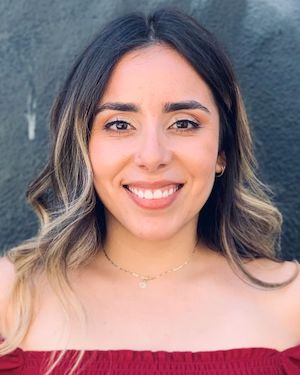
10 tips from me to you ⟩
December 20, 2021, by Silvia
My DMs — and by DMs, I mean email — have been poppin’ with variations of the same question: “Any advice/tips regarding the program or in relation to pursuing higher education?”
To be completely honest, I don’t know how I have made it this far. I guess it really is fake it till you make it, am I right? When you’re a first-gen student not only do you not have people to guide you through this journey, but you also don’t know what questions you should be asking to those that may be able to advise you. There’s a lot that I wish I would have known before romanticizing the idea of being the first in my family to go to college, pero no pasa nada oiga. Ya estamos aquí, y lo que me toca a mi is to share some of the things that have helped me thrive as a student and person. I’ll preface the rest of this blog by saying that these are general tips that I have put together as I look back on my academic career, but feel free to reach out for more specific advice if you need.
Okay so here we go, Blogmas day 10 = 10 tips from me to you. 😊
10. Develop a morning routine
Morning routines are your friend. When I started the program, it was completely online, which made it easy to wake up minutes before class, roll over, grab my laptop, and log on from bed. It also made it easy to fall right back to sleep . . . oops. Needless to say, this was not a productive or effective start to my school day; I felt like I needed to do something to feel awake and alert for class in the mornings. One day I decided to wake up early to work out before class and let me tell you, it was life changing. I live by my morning routine and think we should all have one. Some one told me that there are two instances during which we can have the most control over our days — you can’t control what happens throughout your day, but you can decide how you start and end your day (for the most part). I choose to start my day with a morning routine because it sets the mood for the rest of my day and makes me feel accomplished from the get-go.
Silvia’s morning routine: wake up between 6:00 AM – 6:30 AM, do a 20-minute workout, drink a cup of water + coffee or tea, do my skincare.
9. Sleep
Raise your hand if you’ve ever been told to get a good night’s sleep before an exam because you’ll do better than if you stay up late trying to cram . . . but you still chose to stay up? I won’t raise my hand because I don’t believe in pulling all-nighters. In undergrad I may have pulled one or two, but since starting OT school, I don’t compromise my sleep. Listen to NPR’s Ted Radio Hour podcast “Maslow’s Human Needs” starting at 6:30 — you can thank me later.
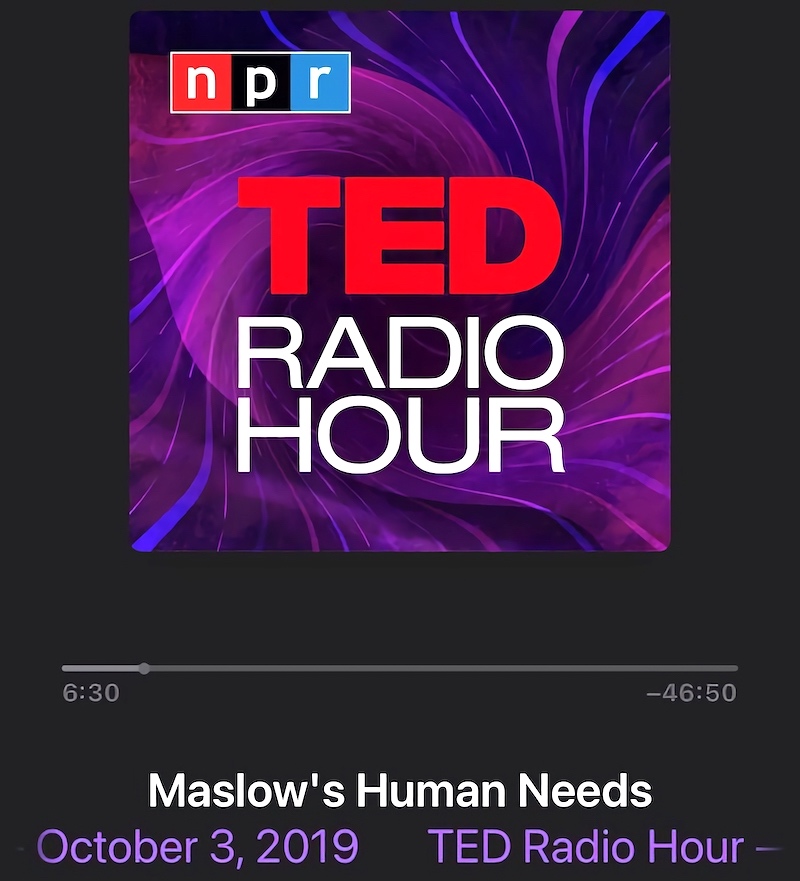
NPR Ted Radio Hour
8. Take a mental health day
That’s it. That is the advice. Don’t go to school, don’t go to work. Take a mental health day.
7. You don’t have to be productive every day
The student urge to make a to-do list of everything they want to get a head start on/finish when they have a day off is real. It’s me, I’m student. Last semester I had class Monday-Wednesday and fieldwork on Fridays. Thursdays were my free days and when I tried to be as productive as I could by getting ahead on readings or finishing assignments, on top of doing ambassador work. Some days though, I was tired and didn’t want to do any schoolwork. At first, I would beat myself up for wasting my day doing “nothing,” thinking it wasn’t “productive.” Truth is, we’ve been conditioned to think that we must always be working or on-the-go, that giving our bodies a rest seems unacceptable. But, in the wise words of my friend Amy, “It’s ok. You don’t need to be productive every day.”
6. Set boundaries
I’m not sure that I do this too well, but Kim said I do so I’m listing it here. Basically, check in with yourself and be realistic of how much you can handle. If you need to say no to something, or push a commitment back, do it.
5. What works for you, works for you
One thing about my cohort is that we help each other out. Everyone shares their study materials — whether it is a Quizlet or a study guide — and I love them for this. However, I can’t stress how important it is to know that what works for them may not work for you and vice versa. When my friends started sharing their study materials for an exam that I hadn’t even thought of, I became anxious, and the impostor syndrome kicked in. Was I smart enough or competitive enough to be in this program? I had to give myself a pep-talk to remind myself that we have all gotten here doing things differently and what works for me, works for me, anything beyond that can be used to supplement my study skills and habits. Let me know if you need a pep-talk.
4. Plan your days
I use my planner religiously. Even if my days look the same every day, I write down my schedule to a T, and try to stick to it as much as possible. Similar to my morning routine, this gives me a sense of control over my day, and there’s just something so satisfying about crossing things off as you go through your day.
3. “Not my best work” is good enough
If I had a dollar for every time I turned something in last semester and said, “that was not my best work,” I would have a lot of money, still not enough to pay my tuition, but enough to kick off my last semester of grad school with a girls trip.
For real though, doing the bare minimum is good enough sometimes. If you want to have a life outside of school, while still being a “good student,” you’re going to have to learn to prioritize which assignments need to be your best work, and which don’t. If it is a credit/no credit assignment do not spend more than an hour on it (and that’s pushing it).
2. Fake it till you make it
Pretty self-explanatory, I think.
1. Grades don’t matter
Ok, they do . . . but not really. All I can tell you is that if you’re debating between 1) depriving yourself of your favorite and restorative occupations to stress over studying to get an A, or 2) studying modestly while also balancing your other occupations and getting a B, do the latter. There’s more to life than school. You’re still going to graduate and become a great occupational therapist.
Alright friends, that’s it. I have to get back to babysitting but I’ll be back for Blogmas day 2!
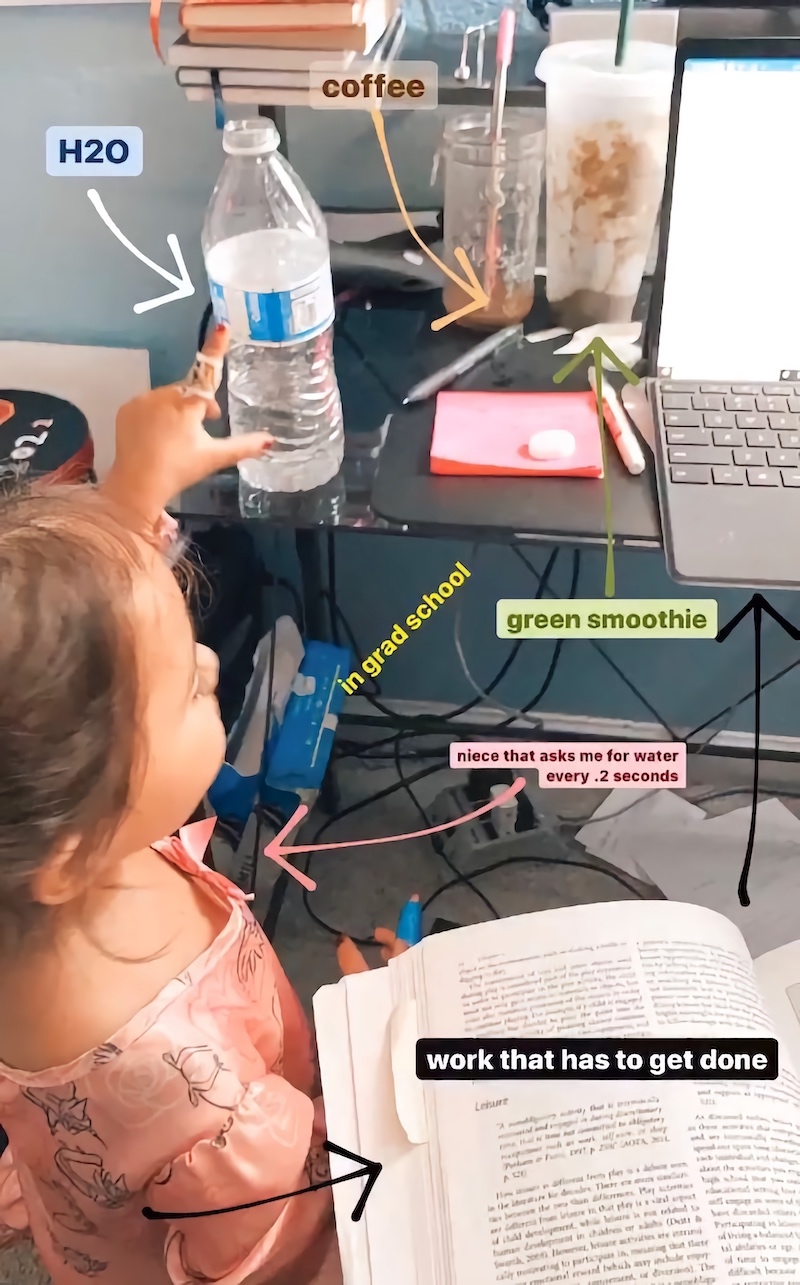
Zoom University days with my niece, Demi
⋯
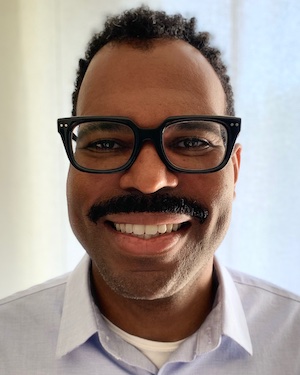
11 out of 12 Instrumental Activities of Daily Living ⟩
December 17, 2021, by Guy
With 11 days until the New Year, I have chosen to write about 11 of the 12 Instrumental Activities of Daily Living that have influenced my life. In the Occupational Therapy Practice Framework: Domain and Process (4th ed.; AOTA, 2020), Instrumental Activities of Daily Living are defined as activities to support daily life within the home and community that often require more complex interactions than those used in ADLs. While those of us interested in occupational therapy often focus on ADLs, I have come to realize how essential the following 11 Instrumental Activities of Daily Living are to me. These activities not only help to give my life meaning, but they give me an interesting way to look at some of the things I have accomplished this past year and what I want or need to do in the upcoming year.
1. Care of others: Caring for others helps me to gain a realistic perspective on my own life, gets me out of my head, and gives me some humility. This past year I have spent a lot of time helping my 98-year-old father. This past week I have been helping him to move. While stressful, I am getting to spend more time with him which I recognize is such a precious thing. I am grateful for his love and have been reminded how lucky I am to have him in my life. Hopefully I can continue to care for him in the same way he has always cared for me.
How have you cared for others this past year? How can you be of service in 2022?
2. Care of pets: Every other month this past year one of my dogs was sick. Last week my dog Jack refused to eat and had some sort of doggie norovirus. Yuck! My other dog Sharon seems to have some sort of problem with her paws every other month. It’s all good because they provide me with so much love and attention. Although they are not official emotional support animals, they take care of me more than I care for them.
Do you have a pet? If you haven’t but have always wanted one, maybe 2022 is the year!
3. Communications management: With Covid, keeping connected with others has been so important to maintaining my emotional health. I have even resorted to writing letters this past year. While I don’t do the holiday card thing, this time of year reminds me to reach out to my friends and family to let them know how much they mean to me, and to tell them how honored I am to have them in my life.
Is there someone you have wanted to speak to for a long time but just haven’t got around to it? Trust me, get in touch while you can!
4. Driving and community mobility: New York City has great public transportation, so you don’t really need a car. LA, the public transportation can be challenging. I feel lucky that my wife and I, having lived in NYC for so long, have no problems navigating the city using public transportation or by walking. But I am also extremely fortunate to have a car. Especially when we need to get out of the city to see nature. I hope that this upcoming year I can see more of California like Yosemite, Death Valley, and maybe the Redwoods.
Where have you gone? Where are you going?
5. Financial management: With one semester left to go before graduation, I know many of my classmates have been talking about paying back loans, potential benefits and salaries, and other money matters. While daunting, it has opened my eyes to how helpful it is to talk to others who share my worries about money. So many of us try to figure all this money stuff out on our own. We don’t need to suffer in silence.
Do you have someone you can talk to about your finances? Is there someone you know and trust that can support you with money matters as you get ready to start graduate school or graduate?
6. Health management and maintenance: This past year I got back into running. I’m now up to running 4 days a week in the morning. Next year I want to run a half marathon. It isn’t always easy to get up and run. Some days I just don’t want to do it even though I know I always feel better when I run. On days when I don’t want to run, I remind myself of a phrase I learned in my pediatric immersion class, “When in doubt prope (proprioception) it out”.
Do you have any health maintenance routines? What will you do to support your health and wellness in 2022?
7. Home establishment and management: Recently my wife and I have been going back and forth about getting a new bed. After putting a lot of effort into creating a nice place to live, this is the one thing in our house that still needs to be addressed. However, the cost of a new mattress/bed is expensive! We both know we need to be comfortable sleeping – Am I right?
How have you made your home comfortable? Are there any changes that you would like to do to make it better?
8. Meal preparation and cleanup: Food, glorious food. I sure have been cooking a lot. One major change this year was unforeseen. My wife decided to become gluten free, so I also became gluten free. This has added a whole new dimension to preparing meals and dining out. I became that Guy who knows all about gluten free pizza and cookies. The benefit of this change is I have healthier eating habits and am much more mindful of what is going into my body. I also have been thinking about what it could be like to cut out meat or at least limit my consumption of meat.
What types of new foods have you discovered? What types of food or meals to you think you might want to prepare in 2022?
9. Religious and spiritual activities and expression: I feel like I have neglected this aspect of my life and as a result can tell a difference in my day-to-day outlook. I lost someone very close to me this past year which awakened this otherwise dormant part of me. So many questions after experiencing the death of a loved one . . . so many questions.
10. Safety and emergency maintenance: There was one earthquake this last year that was rockin’. Yuck. I forgot about how earthquakes felt while living in New York. We had hurricanes and snowstorms, but they didn’t compare to the feeling I had with this earthquake. I thought what if the “big one” comes? As a result, we put together an emergency kit and started getting together some nonperishables just in case the big one happens or if there happens to be a Zombie apocalypse.
All kidding aside, how can you keep up your safety and emergency maintenance?
11. Shopping: Shopping has been a challenge as this year. Especially as a student with a limited income. However, I have mastered the art of making food shopping lists that are always within budget. Also, as an OT student I fortunately am not needing to keep up with wearing the latest fashion . . . but I do like me some clothes so maybe next year I’ll try to set aside some money for some new threads . . .
Have you noticed inflation? How are you dealing with rising costs going into 2022?
And about that 12th IADL — Child Rearing . . . Well, I don’t have any children right now, but maybe in 2022? We will see?!
As you reflect on your 11 or maybe 12 IADLs, I hope they are as enlightening to you as they have been for me. Have a Happy New Year.
⋯
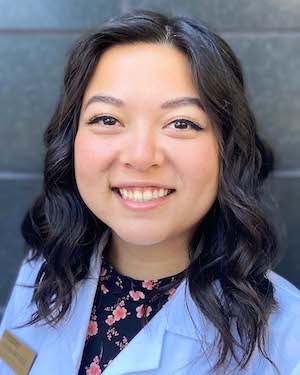
12 Weeks of Fieldwork ⟩
December 16, 2021, by Alyssa
Welcome to a special edition of student blogs! For the next 12 days, we will be sharing a blog every day. To kick us off, I’m excited to tell you about my 12 weeks of fieldwork.
Level II fieldwork is a full-time 12-week clinical experience in any occupational therapy setting. As part of the Entry-Level MA, you do two of these in the 2nd and 3rd summer. I felt set on doing one of my Level IIs in a pediatric hospital, but many of those want someone who has already done a Level II in an adult hospital setting. So here was my criteria for searching for my first Level II: (1) Adult hospital setting (2) In a new and interesting place.
That was it really. I had little sense of what I wanted to get out of working with adults. In fact, I was terrified of working with adults. I had only ever worked with children and knew I loved it, so it never crossed my mind to pursue something else.
We can request fieldwork sites anywhere in the country, so I browsed the map of sites and picked Marianjoy Rehabilitation Hospital as my top choice. No one from USC had done their fieldwork there before, but it hit both of my criteria. It is a hospital with inpatient, outpatient, and day rehab programs in Wheaton, IL, a suburb of Chicago. And luckily - I got placed there! So after a lot of scrambling to find housing in Illinois, a state I had never been to, I packed up all my stuff and moved for the summer of 2021.
Here’s what my 12 weeks looked like.
Week 1: Observation, Loneliness, Exhaustion
To start out, I experienced a combination of excitement, overwhelm, and imposter syndrome constantly for the whole week. I was thankful that my site had weekly objectives for their fieldwork students, and week 1 was mostly observation. Even so, it was hard not to freak out knowing I would be actually doing what I was watching in a few short weeks.
It was tough adjusting both to a new role as a fieldwork student and to a new city at the same time. I only knew two people in the area, all the grocery stores were different, and I felt like a foreigner. I was subletting an apartment in Chicago and commuting 45-90min to and from the hospital. My hours were 6:30am - 3pm, but I tried to get there by 6. By the time I got home around 4:30/5, I’d eat dinner and immediately get ready for bed so there was no time to socialize. In all senses, I was exhausted.
Week 2: Leaning on Other People
By week 2 I was starting to feel more comfortable with the other people at the hospital. The OT schools in the Midwest had a different schedule, so the other fieldwork students were already halfway done when I came in. The conversations I had with them were the reassurance I needed that I was going to be fine.
The other therapists, nurses, and hospital staff were incredibly welcoming. I somehow picked a random site off a map and ended up at the nicest hospital in the country. It put me at ease knowing they were used to having students around and weren’t judging me for asking questions.
Above all, my fieldwork educator could not have been a better match for my learning style. He was great at giving constructive feedback in a way that was encouraging and he boosted my confidence when I was clearly very anxious.
Week 3: Sweaty
Each floor of the hospital was sectioned into different clusters of patients. I was placed in the inpatient brain injury rehab unit, where each therapist has about 7 patients on their caseload that they see mostly every day. At this point, I was expected to take on a couple of my fieldwork educator’s patients onto my own caseload. There was a lot of sweat, but I was really enjoying getting to connect more closely with the patients.
Week 4: Getting Into the Groove
As I gradually built up my own caseload each week, I started to feel more competent in my own skills and useful as a teammate to my fieldwork educator. Plus, after 4 weeks, I had finally adjusted to my new normal of being asleep by 9pm and waking up at 5.
Week 5: Emotional Support Ice Cream
Weeks 5 and 6 looked a lot like week 4. I added about 1 new patient to my caseload each week and spent more time planning/documenting/reviewing with my fieldwork educator. Objectively, the workload was increasing, but it was a comfortable pace and I was feeling good.
I was also improving my life balance, including prioritizing meal prepping and making more time to socialize (especially weekly Bachelor/ice cream nights with friends).
Week 6: Midterm Eval
Woohoo halfway through! Anxiety no more! Just kidding. You get evaluated at the end of week 6 and I was really worried for nothing. I had been getting consistent feedback from my fieldwork educator, and the evaluation session was helpful for us to elaborate on that feedback and set goals for the second half of the summer.
Weeks 7-11: Full Caseload, Feeling like I Belong
The gradually-building-up-to-a-full-caseload part of fieldwork was over. I was still working closely with my fieldwork educator, but the goal was for me to lead all the sessions. Even though I had become more comfortable with treatment planning, the nature of brain injuries is unpredictable and you never knew what the next patient would be like — which was both challenging and exciting as an opportunity to get creative working in a hospital.
The role of a fieldwork student at this point of the experience was an unfamiliar middle ground between student and professional. Obviously, I was still learning and building my skills, but at the same time I felt like I was really in it and working. I got to collaborate with an amazing PT and SLP, my documentation required minimal review, and I got such kind comments from patients who were surprised I was a student. I really felt like I belonged.
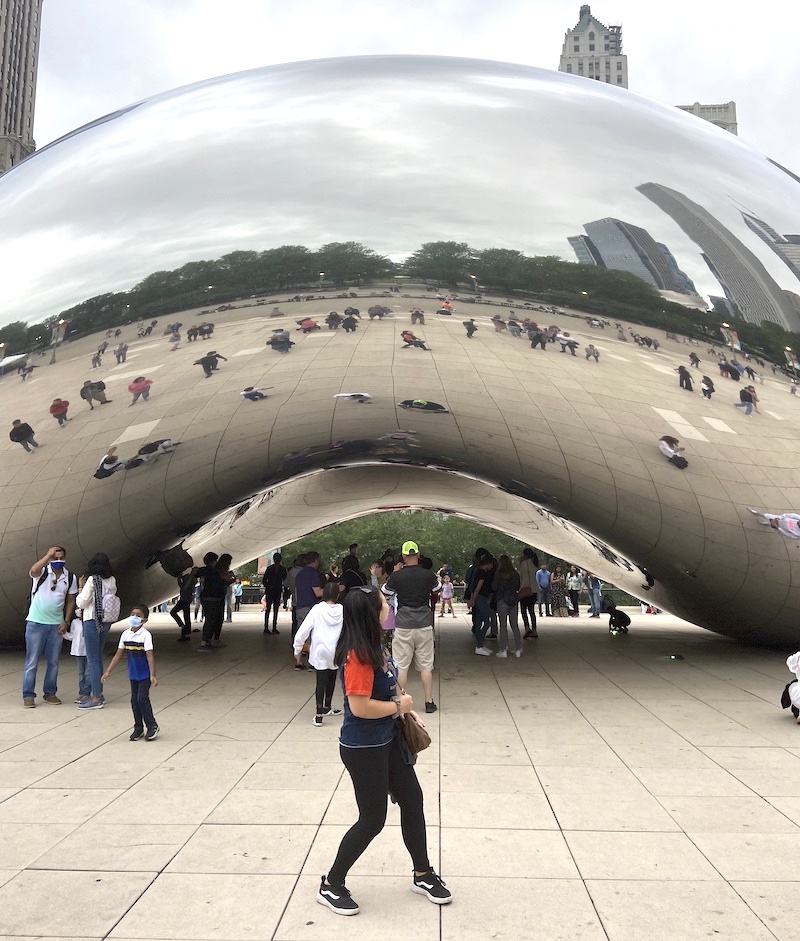
On the side, I crammed in some Chicago tourism.
Week 12: A Tearful Goodbye
I am a sprinkler when it comes to saying goodbye. On my last day, I cried on the way there, I cried saying goodbye to everyone, and I cried on my way home. I never thought I would love working in this setting so much, and it was so hard to think about it being over and going back to school for a year before my next Level II. Looking ahead, I still can’t wait to try out pediatric hospital work, but I’m happy to know there’s a part of me that likes working with adults too.
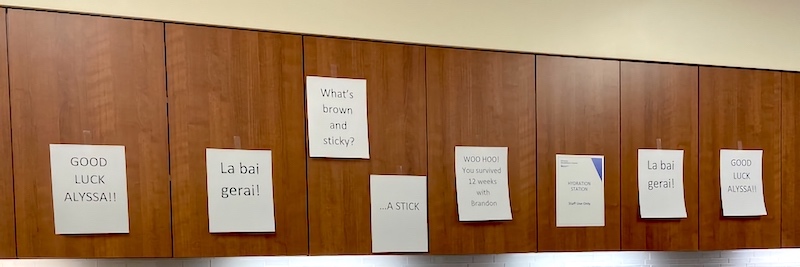
Signs up in the therapy gym for my last day with references to some inside jokes/memories from the summer.
If you’ve made it this far, thanks for reading! TLDR: My Level II fieldwork was expectedly challenging but unexpectedly awesome.
⋯
My Experience with the Pen Pal Program ⟩
December 13, 2021, by Global Initiatives Team
By Abraham Ramirez, Entry-Level Professional Master’s student
Editors Alison Chang and Vanessa ElShamy
Entry-Level Professional Master’s students
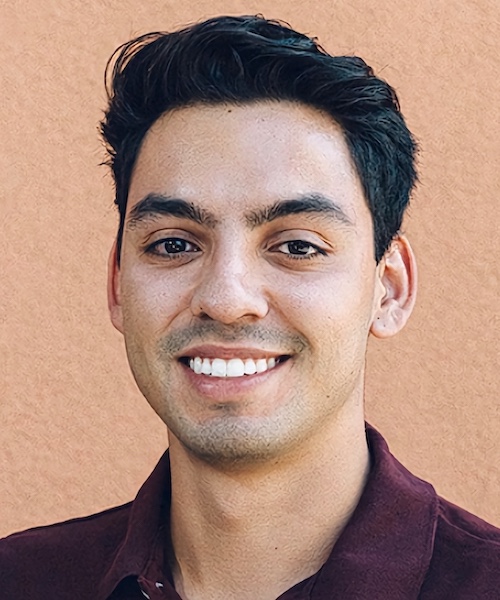
Abraham Ramirez
One of the meaningful projects that I’ve been involved in within Global Initiatives is the Pen Pal Program. I was lucky enough to be connected to two students in Colombia who were both in the same year at the Escuela Colombiana de Rehabilitacion. This was a great opportunity to learn about occupational therapy and its scope of practice in Colombia. My pen pals and I communicated in Spanish because it’s the most widely spoken language there.
What is the most memorable letter that you’ve received from your pen pal?
Even though the program has the word “pen” in the title, my pen pals and I decided to communicate through Instagram messenger via group chat, as well as Zoom when we found the time. Our group chat conversations revolved mostly around the OT profession in our respective countries. However, the most meaningful experience was communicating over Zoom. We talked a lot about differences in culture between Mexicans and Colombians, since I’m culturally Mexican. We also discussed nuances in Spanish and how the language has evolved in Colombia and Mexico. It was interesting to find the beauty in the uniqueness of our cultures, as some may make assumptions that countries in Latin America are all similar.
What is the best thing you have learned from your pen pal?
I learned about how OT education is different in Colombia compared to in the U.S. In Colombia, you currently only need a bachelor’s degree to practice as an OT. Additionally, from the way they explained their curriculum, it seemed like there’s an emphasis on hands-on approaches. I also like that they place emphasis on OT in the “sector laboral,” or “the workplace.” For example, one of my pen pals had a rotation at an airport where she completed ergonomic assessments for the personnel.
What message would you send to your pen pal right now if you had only 2-3 sentences to say it?
If I were to send a message to my pen pals right now, I would honestly just say that I appreciate their openness to friendship, even though there are hundreds of miles between us. It’s great to know that there’s people across the world that enjoy speaking with you.
⋯






